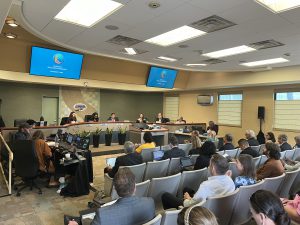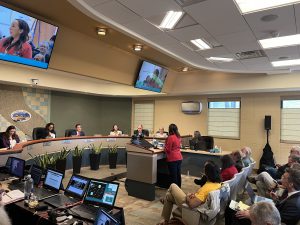![Imperial Beach Pier, California [cropped] (https://www.flickr.com/photos/photos_by_clark/22535917046) by Photos By Clark (https://www.flickr.com/photos/photos_by_clark/) is licensed under CC by 2.0 (https://creativecommons.org/licenses/by/2.0/). View of the pier from the beach as the sun sets behind and to the left of the pier and seagulls dot the shoreline.](https://slcprdwordpressstorage.blob.core.windows.net/wordpressdata/2024/10/Imperial-Beach-Pier-cropped.jpg)
The City of Imperial Beach hosted the State Lands Commission for its October meeting. Mayor Paloma Aguirre welcomed the Commission and provided key remarks during a briefing on the Tijuana River transboundary pollution crisis. The Staff Reports supporting the Commission’s actions and the Executive Officer’s Report contain additional information about today’s actions and the projects, programs, and initiatives staff is leading.


Summary
- Authorized 34 leases for the use of public lands and resources, 11 of which included public access provisions.
- Authorized one sublease, five bond or rent revisions, five lease amendments, and one lease assignment and amendment.
- Accepted one natural gas quitclaim deed.
- Authorized one geological survey permit.
- Authorized staff to remove and dispose of an abandoned vessel in the Delta.
Tijuana River Transboundary Pollution Crisis
Staff briefed the Commission on the status of the Tijuana River pollution crisis and efforts by the U.S. Section of the International Boundary and Water Commission (USIBWC) and San Diego Regional Water Quality Control Board to address transboundary flows. The Mayor of Imperial Beach provided in-depth information about the effects of the crisis on the community, particularly the public health impacts. State Senator Padilla, staff from Assemblymember Alvarez’s office, the USIBWC, the San Diego Regional Water Quality Control Board, the Port of San Diego, the U.S. Navy, San Diego Coastkeeper, Surfrider Foundation, and environmental justice groups affected by the pollution also commented. Importantly, the Commission heard directly from residents and community members about their experiences, insights, fears, and concerns about the impacts from the pollution crisis. The Commission directed staff to continue leveraging relationships with its lessees, government partners, and stakeholders to build momentum toward a resolution, and continue advocating for funding. The Commission directed staff to recommend a letter to the federal government requesting that they do everything in their power to quickly and comprehensively resolve the pollution crisis, which will be considered at the Commission’s December meeting. The Commission also directed staff to agendize a support position on the Border Water Quality, Restoration, and Protection Act of 2024 at its December meeting.
San Francisco State University Estuary and Ocean Science Center
The Commission authorized a lease to the San Francisco State University and Estuary and Ocean Science Center that facilitates climate change research and habitat restoration and supports the Center’s marine ecology, wetlands ecology, and biology coursework. The lease also facilitates research through wildlife surveying and the continued operation of a weather station.
Oyster Reefing: living shorelines
The Commission authorized a lease for the installation of oyster reef structures at West Point Slough in San Mateo County. The reef structures, made of plant-based cloths that will degrade over time, are part of a levee improvement and living shoreline construction project. They will reduce tidal action on the levee, improve water quality, and promote resilience for the living shoreline.
Farallones and Monterey Bay National Marine Sanctuaries
The Commission acted to improve the ecological health of two national marine sanctuaries by authorizing a lease to remove marine debris at 20 sites that pose public health and safety risks, pose potential threats to sensitive natural resources, and impede navigation. The authorization encompasses the removal of three abandoned and derelict vessels (including a 92-foot yacht), one personal aircraft, and 16 anchor chains and buoys from the marine sanctuaries.
San Onofre State Beach: Retrocession
The Commission authorized a jurisdictional transfer, called a retrocession, that allows the state and the United States to share civil and criminal legislative jurisdiction at San Onofre State Beach in San Diego County. This action was requested by State Parks and the U.S. Marine Corps and will allow state and local emergency services personnel to provide vital services to those accessing and recreating at the San Onofre State Beach.
Coastal Wetlands: Batiquitos Lagoon
The Batiquitos Lagoon, one of the few remaining tidal wetlands on the California coast, is a beloved coastal wetland and estuary in San Diego that is open to the public. The Commission authorized its Executive Officer to enter into an agreement with the California Department of Fish and Wildlife to facilitate vital dredging work to keep the Lagoon operational and publicly accessible. The Commission owns most of the 544-acre property and leases it to the Department of Fish and Wildlife.
Homeless Encampments on State Lands
The Commission adopted a policy for accessing and vacating homeless encampments on state land under its jurisdiction. This follows a gubernatorial Executive Order issued in July requiring agencies and departments to adopt policies generally consistent with a Caltrans encampment policy. The Commission’s policy is modeled on the Caltrans policy, contains due process requirements, such as working to ensure services and shelter, and is subject to available funding. Today’s action follows the Commission's action last year authorizing the Executive Officer to enter into cooperative agreements with other jurisdictions to address the unhoused on state-owned sovereign or school lands.
Future Meetings and Ways to Stay Informed
The Commission's next meeting will be on December 17 in Sacramento. You can sign up to receive updates about future meetings or follow us on Instagram, X (formerly Twitter), and YouTube. You can watch a webcast of the October meeting and past meetings on Cal-Span.

